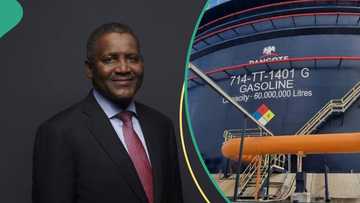Nigeria's Fuel Crisis May Persist as Modular Refineries Face New Threat
- Investment in modular refineries is now at risk amid a stalemate in the federal government's Refinery Development Fund
- As a result, Nigeria's fuel crisis may likely continue as the refineries face a shortfall of crude supply under a market-driven pricing system
- Refinery owners disclosed that investors are currently facing challenges in securing crude supply to maintain their operations
Don't miss out! Join Legit.ng's Sports News channel on WhatsApp now!
Legit.ng journalist Victor Enengedi has over a decade's experience covering Energy, MSMEs, Technology and the Stock Market.
An initiative launched during the previous administration, aimed at boosting investments in the modular refinery sector, is now stifling projects backed by several investors.
The lack of both an Investment Fund and a crude supply arrangement has compounded the difficulties faced by modular refinery operators.

Source: UGC
However, recent findings suggest that the Central Bank of Nigeria (CBN) may have abandoned plans to create a Refinery Development Fund, which was intended to support the construction of these facilities nationwide.
PAY ATTENTION: Сheck out news that is picked exactly for YOU ➡️ find the “Recommended for you” block on the home page and enjoy!
FG pledged supply of crude to refineries
It is worth noting that both the Federal Government and crude oil producers in Nigeria have pledged to ensure a steady supply of crude oil to the nation's refineries, operating under a market-driven pricing system.
The producers, represented by the Oil Producers Trade Section (OPTS) of the Lagos Chamber of Commerce and Industry (LCCI), in collaboration with the Nigerian Upstream Petroleum Regulatory Commission (NUPRC), agreed on a framework designed to be mutually advantageous.
The framework aims to prevent local refineries from being burdened by excessively high prices.
The Chief Executive of the NUPRC, Engr. Gbenga Komolafe stated that President Bola Ahmed Tinubu is fully dedicated to ensuring an equitable business environment for producers and refiners in the industry.
He emphasized the importance of establishing clear guidelines to prevent the pricing models from oil producers from overwhelming domestic refineries.
He also instructed producers and refiners to submit cargo price quotes for crude supply and delivery to the regulator, enabling more effective oversight and regulation of transactions between the parties involved.
Refineries struggling to access crude supply
According to reports, the Crude Oil Refinery-owners Association of Nigeria (CORAN) has 15 members, and its refineries are at various stages of development.
Findings reveal that only 5 of these refineries are nearing full production, while the remaining ten are still under construction and facing challenges in securing funding.
It is estimated that once all 15 refineries are operational, they could collectively produce around 120,000 barrels per day, creating over 2 million jobs.
The status of the Fund, which was to be managed by the CBN, remains uncertain.

Read also
“It is completed: African country discovers new oil wells, ready to rival Nigeria for customers
According to Leadership, the ten refineries, having already invested nearly $20 million, are not only seeking loans but are also struggling to finalize crude supply agreements.
Among the five advanced refineries, Waltersmith, OPAC, and Edo refineries have overcome significant hurdles, while the other two continue to face issues due to a lack of local crude supply.
Aliko Dangote, chairman of the Dangote Group, previously expressed frustration over the unwillingness of international oil companies in Nigeria to provide crude oil to his refinery.
President Tinubu, through the NUPRC, then mandated foreign oil corporations to provide crude oil to the Dangote oil refinery.
CORAN spokesperson Eche Idoko stated that investors are currently facing challenges in securing crude supply to maintain their operations.
He noted that the stalled Refinery Development Fund has been a significant obstacle for the sector and urged the current administration to reconsider the initiative.
He also called on the CBN to take steps toward its implementation.
FG gives conditions for licensing new refineries
Legit.ng earlier reported that the federal government had stated that new modular refinery owners would get financial backing.
Heineken Lokpobiri, the minister of petroleum resources (Oil), stated that the government will give priority to refinery owners in the award of oil licenses.
He revealed this during the inspection of the Waltersmith modular refinery in Imo state.
PAY ATTENTION: Donate to Legit Charity on Patreon. Your support matters!
Source: Legit.ng





